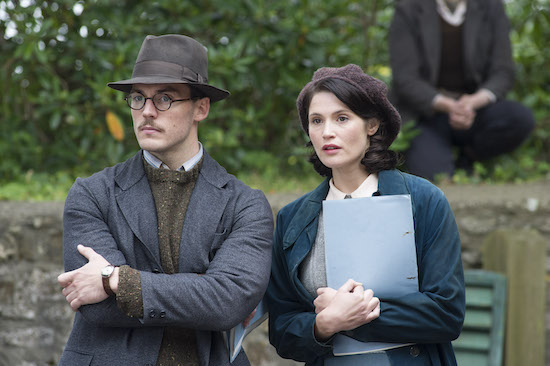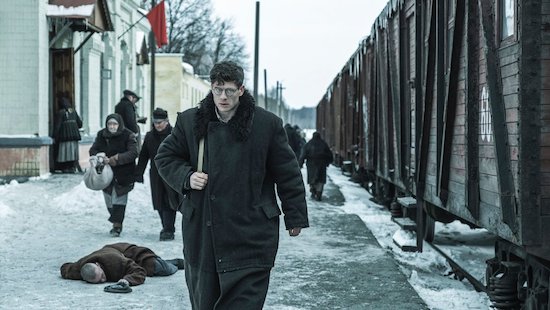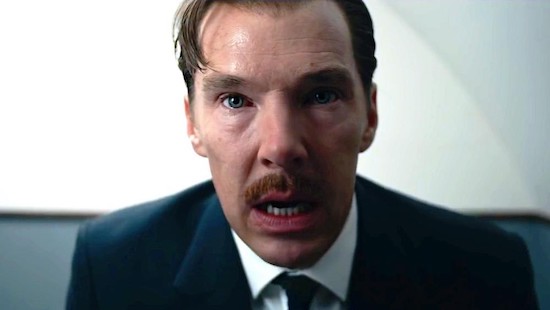There is a famous stretch of British history which runs from May 1940 and the ascension of Winston Churchill as prime minister, to around the time of the Oil Crisis in the early 1970s. Never mind the details, everyone gets the general idea: the siege and miracle at Dunkirk, an improbable single-handed victory against Nazism, the long, slow, grubby winding-down of the Empire, and to cap it all off, a covert war waged against the Soviets. It is the creaky fulcrum around which the country’s destiny swings in all its liver-spotted and tea-stained pomp, the font of its most blessed myths. This period also attracts filmmakers like witches to a coven, wooed by rich lessons in heroism and hubris, crisis and decline. Why, then, are movies made about this time so consistently awful?
Case in point: The Courier, directed by Dominic Cooke, just winding up its theatrical run. To avoid any confusion about who the enemy is, opens with a full-frontal shot of a terrifying bronze bust of Lenin before panning down to reveal an even more terrifying Khrushchev: mewling, corpulent, promising to “bury” the Americans with their nuclear arsenal. The only person who can face up to such terror and come up smiling is a man of outstanding middle-classness with the outstanding English name of Greville Wynne (Benedict Cumberbatch). He is a hapless salesman induced by the intelligence services to voyage to Moscow (which looks like a nuclear winter has already arrived) and seek out Oleg Penkovsky (Merab Ninidze), a turncoat with a conscience. Together, and in complete defiance of the historical record, they will single-handedly solve the Cuban Missile Crisis.
Stiff, arch, artlessly made, and with a temperature chillier than the war they’re fighting, The Courier is a perfect example of the kind of film which, a couple of times a year, every year for almost two decades now, somehow keeps getting made. Broadly erected from the dregs of a “true story” or from a similarly truth-stretching novel, and always met with very gracious three-star reviews, these mid-brow, mid-budget, mid-century, resoundingly middling pictures usually come in a triplet of types: the war thriller, the spy chiller, and the melodrama that contains elements of both, often with a queasy romance tacked on. Doughy, sedate, and thickly tweedy, some achieve critical or box office success beyond what they really deserve: The Imitation Game, Darkest Hour, The Dig. Others have the bones of a distinct style buried somewhere inside: Anthropoid, Their Finest, The Aftermath. Still others were doomed to irrelevance from the start: Red Joan, Six Minutes to Midnight, The Keeper, Suite Française. Occasionally the period can be pushed back to the First World War, as in Tolkien and Testament of Youth, but the results are the same. And then there are those that stand unto themselves as monuments to colossal misjudgement, like Amma Asante’s Hitler Youth romance from 2018, Where Hands Touch. More than the perennially prim workings of royal courts or the manners-comedies of stately homes, these movies are the ones now providing the kyphotic backbone of British cinematic storytelling.

We only need to close our eyes for the paraphernalia of these films to snap to attention. Quaint cardigans, double-breasted flannel, purposefully posed cigarettes; puttering motorcars, the brisk buzz of Bakelite rotary phones, the glow of Emeralite lamps; slops of deco and slugged whisky; teapots, telegrams, tastefulness. If the tone of the films aims for the bucolic and nostalgic, the skies are uniformly golden. If the moment calls for portent and gravity, they are dreadnought-grey. On the occasion that we find ourselves on a battlefield, we will be sure to get a cross-section of the British citizenry running from hard-bitten Northern workingman to good-hearted Somerset ploughboy. Staffing these movies are the usual roster of signature British actors – Cumberbatch, Toby Jones, Mark Strong – whose peculiar faces only make sense when smeared with a moustache or squished into a hat. Above all, there is the extraordinarily bizarre accent everyone puts on: plummy, clipped, and oh so very correct.
There really is no excuse to keep churning this stuff out, especially not in light of two films in particular (both, incidentally, made by non-Brits) which did everything possible to avoid such traps. Dripping with weariness and thick with the fugue of national rot (as John Le Carré adaptations always are), Tomas Alfredson’s Tinker Tailor Soldier Spy in 2011 borrowed enthusiastically from the paranoid vocabulary of 1970s political thrillers like The French Connection, The Conversation, and The Parallax View, and was unafraid to despair of its own heroes. Similarly, Agnieszka Holland’s 2019 feature Mr Jones, set in the late ‘30s, was almost gothic in its enormous interiors and monochrome landscapes, gesturing towards noir like The Third Man. Both films understood that style and form are not incidental but essential to the emotional tenor of their time, and both intuited that the sweep and scale of life can be found in the smallest interactions. In Mr Jones, the entirety of the Holodomor – Stalin’s terror-famine in Ukraine – was reduced down to the haunting sight of two children cooking and eating their own brother. To zero in on the minutiae and have it stand for an enormous historical event takes discipline and tact, none of which is present in The Courier, which buckles under the weight of its own attempt at grandeur.

Still, the dull march continues. In spite of their slavish attention to period detail and their evocations of a lost age, these films seem to have little idea of what British cinema was like in the context of their own settings. This was the time when Alfred Hitchcock was ballooning to his full auteurist girth, when the melodramas were desperate and furtive, like David Lean’s Brief Encounter, and when the war films were epic and aspirational, as in Powell & Pressburger’s A Matter of Life and Death. The secret agents, modelled on the dour Alec Leamas from 1965’s The Spy Who Came in From the Cold, had no doubt that they were “pimping for England,” as James Bond himself put it in the novel From Russia With Love, and they knew it was all a very sordid affair indeed. At least the propaganda then was shameless, not cowed and miserly as it is now, smuggled in by the back door.
We could, with a sneer on our lips, call the parade of tired, boring, quaintly English films of the last twenty years a form of nostalgia – lord knows there’s enough of that on screen now. There must always be an enemy, whether Nazis or Reds. There must always be the impression that things were better then and might be again – that imperial opulence can be reclaimed and virtue restored, the old regimen of class put back together, the country heaved towards a sense of purpose and a meaningful role in the world. The perfect grist, in other words, for the mill of conservative kulturkampf.
Except it’s worse than nostalgia, because at least wan remembrances of a lost age have some connection to fact. These films – preened and groomed, shorn of any moral or aesthetic roughness – are not feeding off history but feeding off themselves: each new entry regurgitates the same clichés into the next. Indeed, the Second World War and its aftermath is far from exhausted of decent tales. There’s a vast realm of untouched material, in the gaps left by Antony Beevor or Max Hastings-style doorstoppers, crying out for radical retellings. Rather, tiresome stories are being invented and portrayed in a tiresome way, powered by a recurring cast of hack writers whose vocabulary is entirely composed of stereotype, who scribble down lines like “You silly goose!” and expect us, piled politely into matinee screenings, not to laugh. Except that we should laugh, and treat all of this for what it is: evidence of a culture pitifully crumbling, half-blind and grog-blossomed, possessed by a fantasy, wrapped in an old bathrobe, bumping into the furniture.


